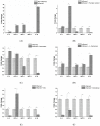Evaluation of the Immunomodulatory Effects of a Probiotics and Natural Extract-Based Formulation in Bacterial-Induced Prostatitis
- PMID: 36836748
- PMCID: PMC9965078
- DOI: 10.3390/life13020389
Evaluation of the Immunomodulatory Effects of a Probiotics and Natural Extract-Based Formulation in Bacterial-Induced Prostatitis
Abstract
Among the many factors inducing prostate inflammation, bacterial contribution is potentially underrated according to the scientific community. Bacterial prostatitis is characterized by modifications of the prostatic microenvironment, mainly driven by the immune system. Macrophages play a major role in bacterial prostatitis, secreting a plethora of proinflammatory and chemoattractive cytokines and proteolytic enzymes able to degrade the ECM, so facilitating the invasion of other immune cells. Consequently, macrophages represent a link between bacterial infection and prostate inflammation, as well as being the main target of prostate anti-inflammatory drugs and dietary supplements. This study aims to investigate the effect of a formulation composed of active principles and a probiotic strain with a particular focus on the anti-inflammatory effect in an in vitro bacterial prostatitis model. The results obtained showed that the formulation reduces the inflammatory response of prostatic epithelium induced by bacterial infection. This effect is mediated by the modulation of activated macrophages. Analysis of the cytokines released highlights that the tested formulation is able to reduce the expression of key proinflammatory cytokines involved in the pathogenesis of prostate diseases, in particular prostate cancer, and represents a valuable tool to prevent bacterial prostatitis and ensure favorable prostate health.
Keywords: bacterial prostatitis; bromelain; cytokines; inflammation; probiotics; pumpkin extract.
Conflict of interest statement
The authors declare no conflict of interest.
Figures





References
-
- Mazzoli S. Conventional bacteriology in prostatitis patients: Microbiological bias, problems and epidemiology on 1686 microbial isolates. Arch. Ital. Urol. Androl. 2007;79:71–75. - PubMed
-
- Nickel J.C., Roehrborn C.G., O’Leary M.P., Bostwick D.G., Somerville M.C., Rittmaster R.S. The Relationship between Prostate Inflammation and Lower Urinary Tract Symptoms: Examination of Baseline Data from the REDUCE Trial. Eur. Urol. 2008;54:1379–1384. doi: 10.1016/j.eururo.2007.11.026. - DOI - PMC - PubMed
LinkOut - more resources
Full Text Sources

